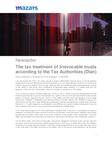
The tax treatment of irrevocable trusts according to the Tax Authorities (Dian)
Last December 20, 2017, the Dian issued Concept 100202208-1440 by which it set its position regarding who should declare its economic benefits in a trust, depending on whether or not the trust had the nature of revocable. This concept -although late- is valuable because it establishes the criteria of the entity on this issue, thus contributing to generate legal certainty in a matter that was not peaceful, since the Dian had already ruled on a couple of occasions on the matter.
Thus, at first, by means of Official Letter No. 13753 of July 27, 2016, the entity indicated that the fact that the beneficiaries of a trust "normalized" their rights in the trust did not mean that the Dian lost its powers of review regarding the tax returns of the settlor and the other beneficiaries of such legal instrument. Likewise, it indicated, at a second moment, through Opinion No. 023832 of August 31, 2016, that only that which was effectively possessed could be considered as omitted asset and that therefore "(...) if with respect to a participation a benefit has not yet been obtained because it has not been realized, that future income could not be declared as omitted asset".
In its most recent opinion, the Tax Authorities indicated that, if the trust is revocable, the person obliged to normalize the rights over the trust is the incorporator, since the assets -despite having been transferred nominally in the name of the trust- continue in the assets of the incorporator, since the latter has the power and authority to revoke such instrument and recover them whenever it sees fit.
On the other hand, if the trust is irrevocable, the person obliged to normalize is the one who has the economic use of the trust and its underlying patrimony, in the terms of article 263 of the Tax Statute. Therefore, it must be carefully studied, in the light of what is established in the incorporation document of the trust and in the letter of wishes of the settlor, who is the person that effectively has the fiscal possession of such assets (the right to use, exploit, dispose and benefit from them), since it will be him -if he complies with the legal requirements to do so- who will be called to normalize such assets.
The concept ends by indicating, with respect to the irrevocable trust, that "the only scenario in which a taxpayer should not file a tax return (neither in the scenario of a normalization nor in the future) occurs when it cannot be effectively predicated of its quality of possessor, that is when it does not hold the direct possession of the assets contributed to the irrevocable trust nor the indirect possession through the perception of any economic benefit (in the terms of article 263 E.T.)".
Although this Concept clarifies several issues, it also generates multiple questions. The first of them is what is to be understood by indirect possession, because although the opinion of the Dian revolves around the concept of possession, in the terms established in article 263 of the E.T., the Dian also extends such article to the so-called indirect possession which it defines laconically as "the perception of any economic benefit" of the assets incorporated to the trust. Due to the relevance and broadness of such term, the entity must define and restrict it in order to generate legal certainty in this regard. The second question arises when the Dian refers to "trusts and similar", thus generating the question of what is understood by "and similar".
Could it be understood that this thesis is also applicable to international trust structures and structures where private interest foundations are used? Although all these structures share common elements, such as being able to reorganize a family estate during the lifetime according to the wishes of a founder, they also have dissimilar characteristics, because while international trust structures and private interest foundations are typical of the Roman-Germanic law systems, trusts are typical of Anglo-Saxon systems, which makes their nature vary considerably.
Due to the sensitivity and relevance of the issue, the Dian should clarify these points so that taxpayers know exactly what is the position of the entity in this regard.


